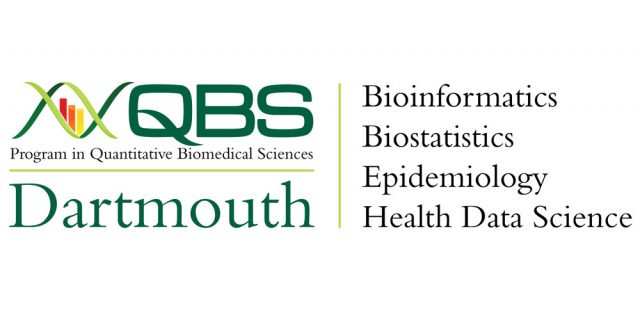The Graduate Program in Quantitative Biomedical Sciences (QBS) at Dartmouth’s Geisel School of Medicine is offering a new Master of Science in Epidemiology degree beginning this fall. Dartmouth’s innovative interdisciplinary QBS graduate program trains students in bioinformatics, biostatistics, and epidemiology.
“I am very pleased to launch this new degree program that brings together our faculty from different disciplines to cross-train students in epidemiology, bioinformatics, and biostatistics to prepare them for a variety of future professional experiences,” says Duane Compton, PhD, dean of Dartmouth’s Geisel School of Medicine.
 This program is designed to appeal to those interested in epidemiologic methods, biostatistics, bioinformatics, data analysis and translational research, giving graduates competencies in the theory and application of epidemiologic methods in order to solve complex problems in population health.
This program is designed to appeal to those interested in epidemiologic methods, biostatistics, bioinformatics, data analysis and translational research, giving graduates competencies in the theory and application of epidemiologic methods in order to solve complex problems in population health.
“We anticipate graduates will seek anywhere from traditional academic careers to those in government, biotechnology and health companies, and ones we have yet to imagine,” says Margaret Karagas, PhD, the James W. Squires Professor and chair of the Department of Epidemiology at Geisel. “We're excited about this opportunity to train the next generation of epidemiologists equipped with cutting edge skills in bioinformatics and biostatistics in the context of a robust epidemiology method.”
According to Diane Gilbert-Diamond, ScD, QBS associate director and faculty lead for the degree program, one thing that sets this program apart from others is the 4+1 option for Dartmouth undergraduates who can take up to three graduate courses prior to matriculation in the master’s program, allowing them to complete the program one quarter sooner. In fact, two members of Dartmouth’s recently graduated Class of 2018 have taken advantage of this option as undergrads and will begin the graduate program this fall.
“Dartmouth undergraduate students already receive world renowned liberal arts training in the Arts and Sciences,” says James O’Malley, PhD, QBS director. “By linking interested undergraduate students with a master’s degree program in epidemiology that is unique for its quantitative rigor and focus, we provide students an efficient pathway to obtaining a stellar and unique combined qualification in five years at Dartmouth that will serve them well in both the short- and long-term.”
This fall, Geisel also welcomes the inaugural class of 18 students into QBS’s Health Data Science (HDS) master’s program designed to provide future data scientists interested in healthcare with a broad range of core skills. The HDS master’s program is more quantitative, computational, and data-focused than the Epidemiology master’s program, which has more of a focus on study design and molecular biology, but students can tailor their own program by mixing and matching to a certain degree between the two.
For more information about these programs, please contact Shaniqua Jones, QBS program administrator, at quant.biomed.sci@dartmouth.edu.
About the Geisel School of Medicine at Dartmouth
Founded in 1797, the Geisel School of Medicine at Dartmouth strives to improve the lives of the communities it serves through excellence in learning, discovery, and healing. The Geisel School of Medicine is renowned for its leadership in medical education, health care policy and delivery science, biomedical research, global health, and in creating innovations that improve lives worldwide. As one of America’s leading medical schools, Dartmouth’s Geisel School of Medicine is committed to training new generations of diverse leaders who will help solve our most vexing challenges in health care.